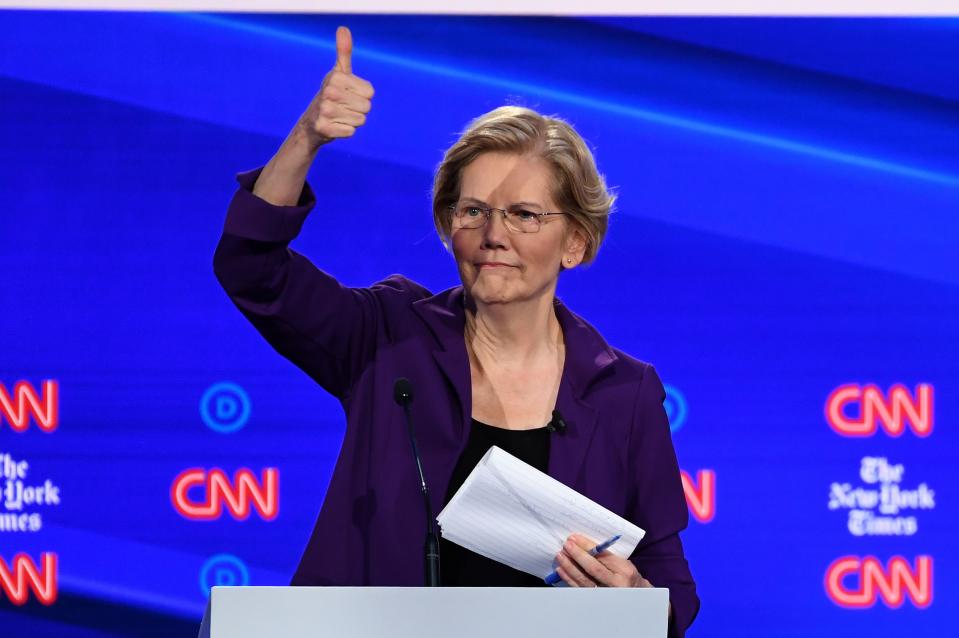Anti-Trump businesswomen are nervous about Warren, and the Democratic debate didn't help
It has been a big month for Sen. Elizabeth Warren. She was center stage in this week's Democratic debate, following recent poll numbers that showed her leading the field. Her third-quarter fundraising total of $24.6 million exceeded former Vice President Joe Biden's and put her on par with Sen. Bernie Sanders, a top fundraiser this year.
But rising along with Warren is anxiety among corporate leaders, especially the growing number of women working in the corporate sector, who fear her strident anti-corporate rhetoric could actually cost Democrats the presidency if she is the nominee.
Typical was this Warren response at Tuesday night's debate: “My question is not why do Bernie and I support a wealth tax. It's why is it does everyone else on this stage think it is more important to protect billionaires than it is to invest in an entire generation of Americans?”
Attacks on corporations could backfire
What Warren says may not be that distinct from other progressives in the 2020 Democratic nomination race, but she built her political stardom as a crusader against corporate malfeasance, and she strikes a particular nerve among those who work in industries she has gone after.
In recent weeks, I have talked with a dozen senior executive women at top financial services, technology, consumer product and health care companies. They all acknowledged Warren’s formidable talents but expressed the same concerns: They want Warren to stop relentlessly vilifying corporate America.

The women I spoke to were all Democrats who had passionately backed and bundled for former Secretary of State Hillary Clinton and President Barack Obama. They dream of a woman president and spend time and resources advocating for women’s advancement at work and beyond, and yet, they are anxious. They particularly worry that Warren’s attacks on industry paint everyone with one brush stroke, lumping in hardworking, well-intentioned, often middle-class workers at big companies with bad actors or self-interested multimillionaires.
Americans don't hate business
Many corporate executives, especially in tech, finance and the pharmaceutical industry, have concerns about the prospect of Warren as the Democratic nominee, but she will likely need many of these people if she wants to win the general election. The concerns of the left-leaning working women I spoke to reflect both a changing tide in Democratic politics and an abiding fear that any big negatives could sink Warren's chances in a closely divided country. They fear that if offended, big-company employees stay home in 2020, especially women, President Donald Trump could win again.
Here comes the squad: Bernie Sanders is big winner in Democratic debate, and not all because of his performance
Republican Sen. Mitt Romney, running for president in 2012, famously said that “corporations are people” and was lambasted for it. The fact is, he was right. Large corporations employ millions of Americans at every level of the economic spectrum. The finance and insurance industries employ 6.1 million people. The pharmaceutical industry supports 4.7 million jobs, which include manufacturing and other middle-income occupations, and the tech sector is estimated to employ 11.8 million people. These include middle-income folks working IT, back offices, retail services and administration.
And among those millions are, of course, millions of women who have steadily risen in the corporate ranks over the past 40 years and are paying close attention to this election. And yet those women, so essential to a Democratic win in 2020, could stay on the sidelines if they feel attacked or vilified by the nominee.
Corporations can be a force for good
It’s not just people working in targeted industries who may find that Warren’s attacks don’t resonate. There is evidence that the general public does not view companies broadly as bad actors. An Edelman poll released this year found that trust in companies is rising. At the same time, according to the Pew Research Center, trust in government is near historic lows.
That trust in business has risen for good reason. Over the past decade, big companies have stepped up to fill voids where government has failed. On everything from paid leave and LGBTQ equity to environmental stewardship and philanthropy, the banking industry and other large corporations have been essential to progress on many issues that candidates like Warren care about.
Let's break it down: 5 reasons why Elizabeth Warren has the best chance to beat Donald Trump
Should companies be held to account when they pollute, corrupt or break the public trust? Of course. But they also should be given credit where it’s due.
Warren has shown a remarkable ability to read the mood and passions of voters, and it has paid off in big ways. But to win the presidency, she might need to consider a more inclusive, even nuanced approach. It remains to be seen if she’s willing.
Lauren Leader is co-founder and CEO of All In Together, a nonpartisan women’s political education organization. Follow her on Twitter: @laurenleaderAIT
You can read diverse opinions from our Board of Contributors and other writers on the Opinion front page, on Twitter @usatodayopinion and in our daily Opinion newsletter. To respond to a column, submit a comment to letters@usatoday.com.
This article originally appeared on USA TODAY: Anti-Trump women of corporate America wish Warren would tone it down

